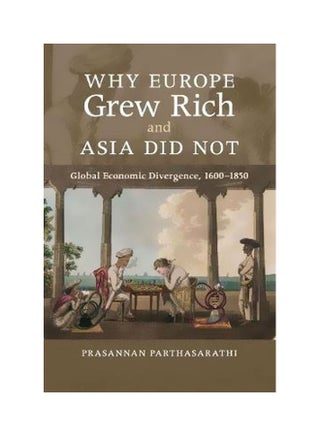استرجاع مجاني وسهل
أفضل العروض



| الناشر | Cambridge University Press |
| تنسيق الكتاب | غلاف ورقي |
| العنوان الفرعي للكتاب | Global Economic Divergence, 1600-1850 |
| المراجعة التحريرية | We have been waiting for more than ten years since Pomeranz opened the debate on the Great Divergence between China and the West for the book that brings India into the discourse. This magnum opus comes from a scholar with the credentials in economics, the erudition in history and the literary style required to occupy the intellectual high ground for the decade to come.' Patrick O'Brien, FBA, London School of Economics 'A stimulating contribution to the 'great divergence' discussion that brings in evidence from South Asia and the Ottoman Empire, as well as arguments likely to be deemed controversial about Indian science and technology. Far from being resolved, this book confirms that the debate over European exceptionalism continues and persuasive explanations for Europe's development and economic growth more generally remain few and incomplete.' R. Bin Wong, University of California, Los Angeles 'Parthasarathi's important new book places India right in the middle of the ongoing debate on the 'Great Divergence' in the world economy. It argues convincingly for a distinct Indian path into the modern world.' Jan Luiten van Zanden, International Institute of Social History "We have been waiting for more than ten years since Pomeranz opened the debate on the Great Divergence between China and the West for the book that brings India into the discourse. This magnum opus comes from a scholar with the credentials in economics, the erudition in history and the literary style required to occupy the intellectual high ground for the decade to come." -Patrick O'Brien, FBA, Professor of Global Economic History at the London School of Economics. "A stimulating contribution to the `great divergence' discussion that brings in evidence from South Asia and the Ottoman Empire, as well as arguments likely to be deemed controversial about Indian science and technology. Far from being resolved, this book confirms that the debate over European exceptionalism continues and persuasive explanations for Europe's development and economic growth more generally remain few and incomplete." -R. Bin Wong, Director of the UCLA Asia Institute and Professor of History "Parthasarathi's important new book places India right in the middle of the ongoing debate on the 'Great Divergence' in the world economy. It argues convincingly for a distinct Indian path into the modern world." -Jan Luiten van Zanden, Professor of Economic History, International Institute of Social History |
| تاريخ النشر | 24/Apr/17 |
| رقم الكتاب المعياري الدولي 13 | 9780521168243 |
| اللغة | الإنجليزية |
| وصف الكتاب | Why Europe Grew Rich and Asia Did Not provides a striking new answer to the classic question of why Europe industrialised from the late eighteenth century and Asia did not. Drawing significantly from the case of India, Prasannan Parthasarathi shows that in the seventeenth and eighteenth centuries the advanced regions of Europe and Asia were more alike than different, both characterized by sophisticated and growing economies. Their subsequent divergence can be attributed to different competitive and ecological pressures that in turn produced varied state policies and economic outcomes. This account breaks with conventional views, which hold that divergence occurred because Europe possessed superior markets, rationality, science or institutions. It offers instead a groundbreaking rereading of global economic development that ranges from India, Japan and China to Britain, France and the Ottoman Empire and from the textile and coal industries to the roles of science, technology and the state. |
| عن المؤلف | Prasannan Parthasarathi is Associate Professor in the Department of History at Boston College. His previous publications include The Transition to a Colonial Economy: Weavers, Merchants and Kings in South India, 1720-1800 (Cambridge University Press, 2001) and The Spinning World: A Global History of Cotton Textiles, 1200-1850 (co-edited with Giorgio Riello, 2009). |
| عدد الصفحات | 380 |

